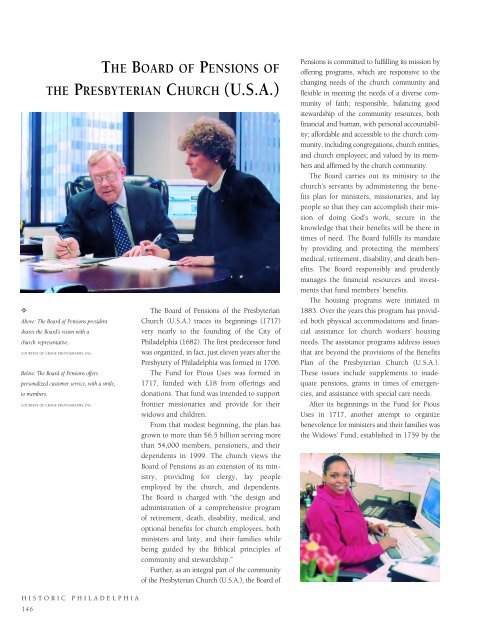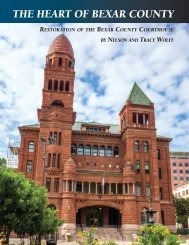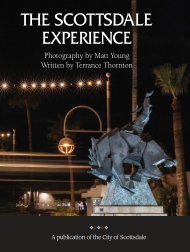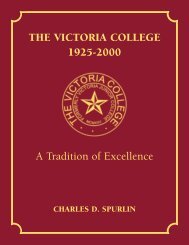Historic Philadelphia
An illustrated history of the city of Philadelphia, paired with the histories of companies, families and organizations that make the region great.
An illustrated history of the city of Philadelphia, paired with the histories of companies, families and organizations that make the region great.
Create successful ePaper yourself
Turn your PDF publications into a flip-book with our unique Google optimized e-Paper software.
✧<br />
Above: The Board of Pensions president<br />
shares the Board’s vision with a<br />
church representative.<br />
COURTESY OF CRANE PHOTOGRAPHY, INC.<br />
Below: The Board of Pensions offers<br />
personalized customer service, with a smile,<br />
to members.<br />
THE BOARD OF PENSIONS OF<br />
THE PRESBYTERIAN CHURCH (U.S.A.)<br />
COURTESY OF CRANE PHOTOGRAPHY, INC.<br />
The Board of Pensions of the Presbyterian<br />
Church (U.S.A.) traces its beginnings (1717)<br />
very nearly to the founding of the City of<br />
<strong>Philadelphia</strong> (1682). The first predecessor fund<br />
was organized, in fact, just eleven years after the<br />
Presbytery of <strong>Philadelphia</strong> was formed in 1706.<br />
The Fund for Pious Uses was formed in<br />
1717, funded with £18 from offerings and<br />
donations. That fund was intended to support<br />
frontier missionaries and provide for their<br />
widows and children.<br />
From that modest beginning, the plan has<br />
grown to more than $6.5 billion serving more<br />
than 54,000 members, pensioners, and their<br />
dependents in 1999. The church views the<br />
Board of Pensions as an extension of its ministry,<br />
providing for clergy, lay people<br />
employed by the church, and dependents.<br />
The Board is charged with “the design and<br />
administration of a comprehensive program<br />
of retirement, death, disability, medical, and<br />
optional benefits for church employees, both<br />
ministers and laity, and their families while<br />
being guided by the Biblical principles of<br />
community and stewardship.”<br />
Further, as an integral part of the community<br />
of the Presbyterian Church (U.S.A.), the Board of<br />
Pensions is committed to fulfilling its mission by<br />
offering programs, which are responsive to the<br />
changing needs of the church community and<br />
flexible in meeting the needs of a diverse community<br />
of faith; responsible, balancing good<br />
stewardship of the community resources, both<br />
financial and human, with personal accountability;<br />
affordable and accessible to the church community,<br />
including congregations, church entities,<br />
and church employees; and valued by its members<br />
and affirmed by the church community.<br />
The Board carries out its ministry to the<br />
church’s servants by administering the benefits<br />
plan for ministers, missionaries, and lay<br />
people so that they can accomplish their mission<br />
of doing God’s work, secure in the<br />
knowledge that their benefits will be there in<br />
times of need. The Board fulfills its mandate<br />
by providing and protecting the members’<br />
medical, retirement, disability, and death benefits.<br />
The Board responsibly and prudently<br />
manages the financial resources and investments<br />
that fund members’ benefits.<br />
The housing programs were initiated in<br />
1883. Over the years this program has provided<br />
both physical accommodations and financial<br />
assistance for church workers’ housing<br />
needs. The assistance programs address issues<br />
that are beyond the provisions of the Benefits<br />
Plan of the Presbyterian Church (U.S.A.).<br />
These issues include supplements to inadequate<br />
pensions, grants in times of emergencies,<br />
and assistance with special care needs.<br />
After its beginnings in the Fund for Pious<br />
Uses in 1717, another attempt to organize<br />
benevolence for ministers and their families was<br />
the Widows’ Fund, established in 1759 by the<br />
HISTORIC PHILADELPHIA<br />
146
















